The fabric weave known as grenadine is prized among the sartorially inclined for its versatility and understated character. But why is it so appreciated, and how exactly is it produced?
All About Grenadine
Those who dress in a suit and tie just because they have to will usually find a plain silk tie, regardless of color, to be good enough to wear with a suit (though hopefully not a shiny silk, lest they look like a boy at prom). A step beyond this is the businessman’s standard: a printed silk tie with some sort of geometric pattern on it. A grenadine tie, meanwhile, comparatively represents a gateway into refined style. It’s truly something different; still very business-appropriate, but versatile enough for more casual use and a sign that you don’t want to settle for the commonplace in the way you dress. Here’s all you need to know about the weave called grenadine.
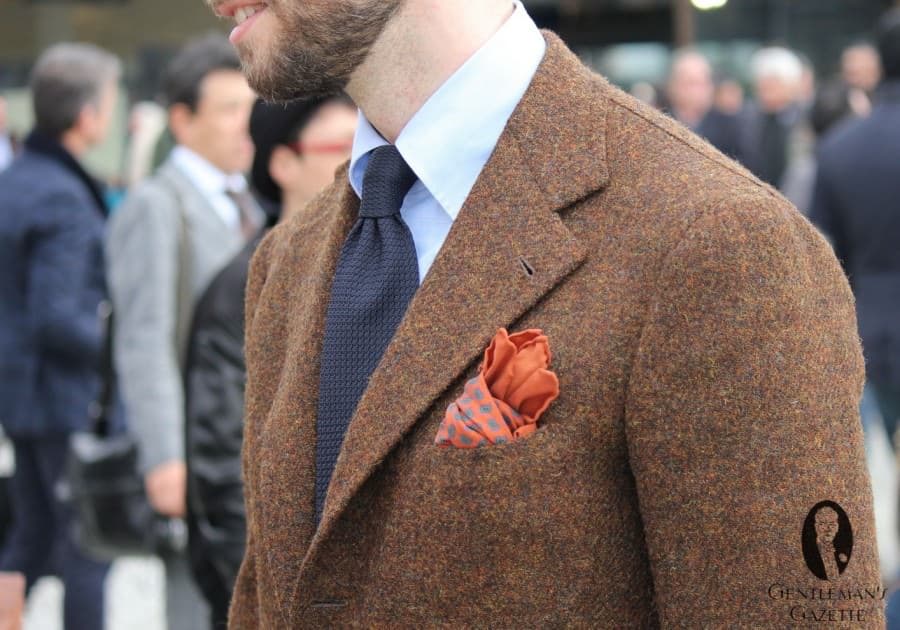
Beautiful brown sport coat with grenadine tie and orange pocket square
A Brief History of the Grenadine Weave
Grenadine is not the name of a material, but rather of a variety of open weave made of two warp (vertical) yarns twisted around the weft (horizontal) yarns that run perpendicular to them; this is also referred to as a “leno weave.” The result is a sheer fabric that is conducive to hot-weather clothing, and grenadine used to be popular for tropical garments. Yet, its earliest known use was in the form of black lace fabric worn in 18th-century France. Some speculate that grenadine originated in Granada, Spain because of the name (and presumably because it can get quite hot there), but it has made appearances throughout Europe, and its exact origins remain shrouded in mystery. The most direct reference we have to its geographic roots is its description as an “English gauze” (“garza a giro inglese”) in Italian. Indeed, giro inglese is still the name used to describe summer shirts made with the weave, and the term “grenadine” refers only to neckties.

Leno weave and a summer shirt made with it
Ties made of silk grenadine are woven exclusively in the Lake Como area of Northern Italy on historic wooden looms from the early 20th century. This mode of manufacture not only adds to the artisanal nature of the product but to its overall mystique (and conversational value). In German, Grenadine is called “Schlinger” which highlights the distinctiveness of the weave.
Types of Grenadine Weaves
Grenadine ties appear most commonly in two varieties–called by the Italian terms garza fina (fine gauze) and garza grossa (large gauze). A third sort of weave found more rarely is the prometeo (meaning “Prometheus,” though the significance of this mythological name is another obscure part of grenadine’s history).

Grenadine Garza Fina & Custom Made Patchwork Vest with Lilly Pulitzer Fabric
The prometeo can best be described as a large honeycomb weave. Lastly, there is garza piccola (tiny gauze), which is even smaller than garza fina, even if the two terms are sometimes used interchangeably by sellers. The difference is largely a choice of how much texture you want to emphasize. That being said, grenadine can be woven in many other combinations, but it just isn’t done anymore, probably because very few machines exist that can weave this kind of fabric.
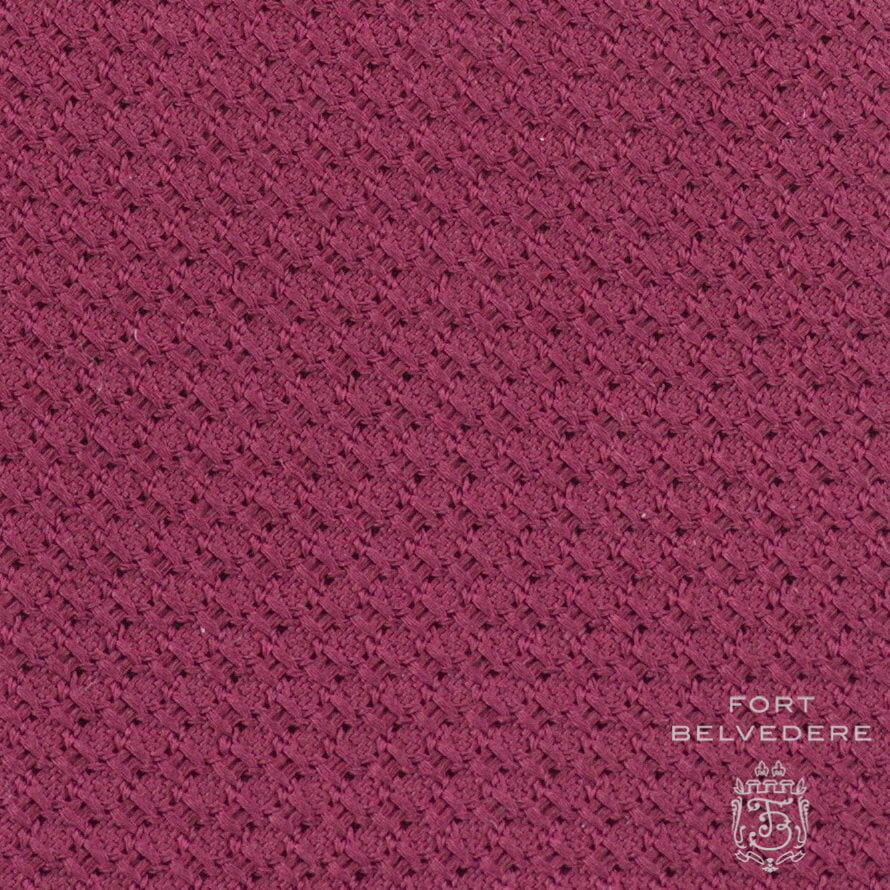
This burgundy silk grenadine tie from Fort Belvedere features a mixed weave of both garza fina and garza grossa.
Finer grenadines (piccola, fina) tend to appear more like smooth solids whereas their larger counterparts (prometeo, grossa) have more visible texture. When the texture of the tie is less noticeable it is slightly more formal, so the fine grenadines can be perceived as especially office-ready.

Sean Connery in From Russia With Love wearing a Garza Grossa Grenadine Tie
On the other hand, Sean Connery’s James Bond wore only garza grossa ties and never fina, always with suits, and his style certainly never suffered for it. Garza grossa and prometeo have quite a visible texture, which can be compared to that of a knitted tie, though a woven grenadine will have a greater formality than any knitted neckwear.
How to Wear a Grenadine Tie
The beauty of grenadine ties–and why they’re so popular among menswear aficionados–is their versatility. Because they’re made of refined silk, you can find them dyed in nearly any imaginable color to coordinate with a range of clothes. The material and weave together also give a grenadine the sheen of a printed tie, along with the texture of a more casual woven one.
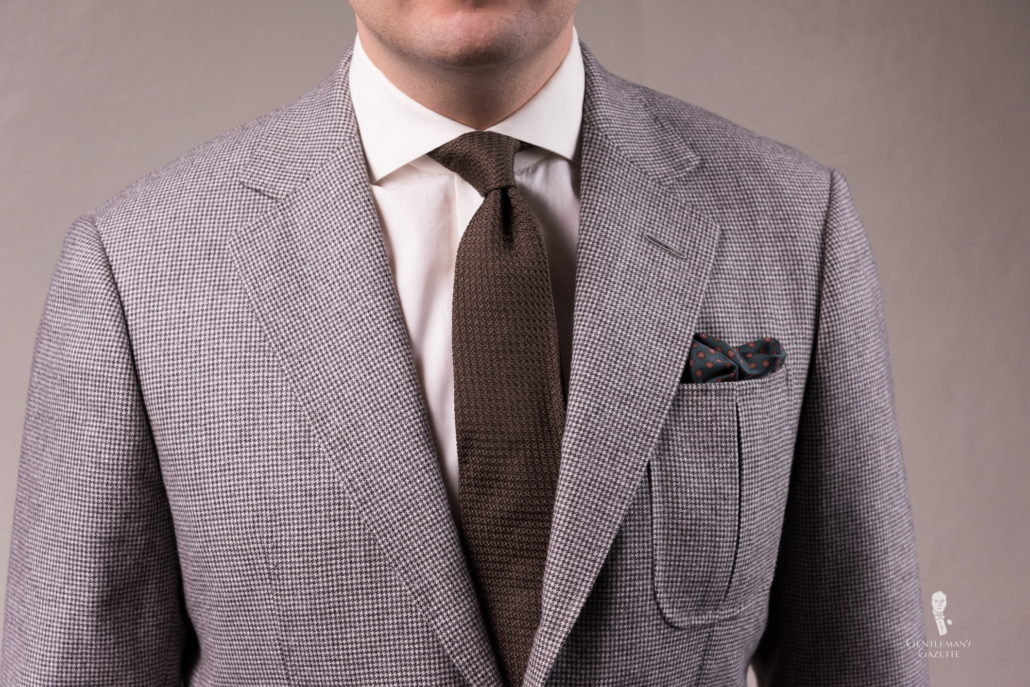
Sven Raphael Schneider in a houndstooth jacket with a brown prometeo grenadine tie from Fort Belvedere
Shine is usually a quality that makes something more formal (think patent leather opera pumps or the silk facings on a tuxedo lapel) while texture usually dresses something down; because grenadine ties have both, they are as equally at home with business suits as they are with button-down shirts and tweed sport coats. The texture of a grenadine tie, especially a garza grossa, works perfectly with more casual sport coats that have a similar repeating pattern, like a houndstooth or shepherd’s check.
Solid, Striped, or Patterned Grenadine Tie?
When starting out with grenadines your first choice will usually be solid colors, because you can pair them not only with plain shirts but also with shirts that have stripes or even plaids. However, grenadine ties are also available with stripes, usually broader ones as well as other patterns. If the stripes are light in color, you’ll be able to see the honeycomb or brick-like rows of the grenadine weave even more clearly on the tie, which adds to the beauty.
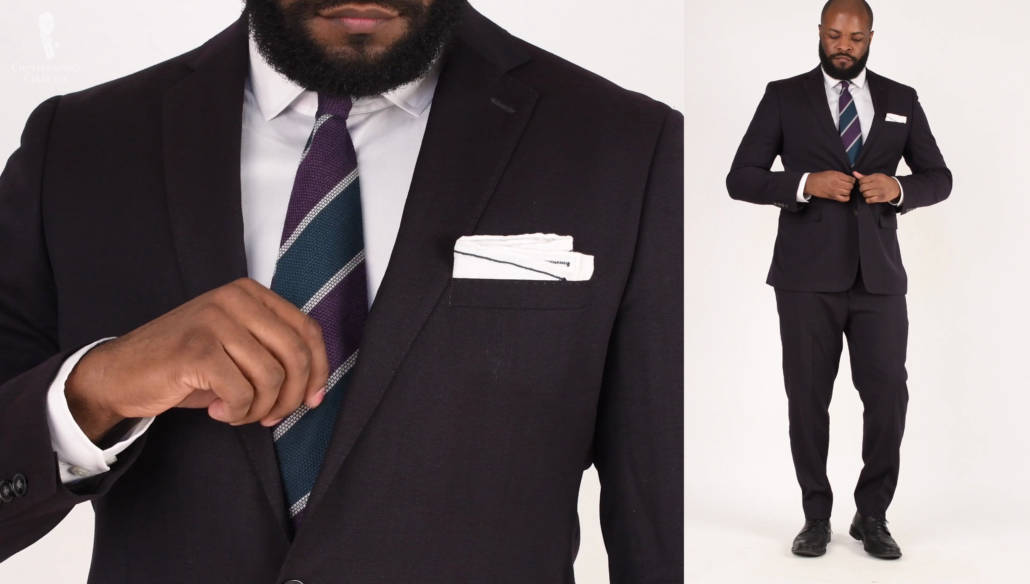
Cashmere Wool Grenadine Tie in Purple, Petrol Blue, Light Grey Stripe and White Linen Pocket Square with Black Contrast Embroidery both from Fort Belvedere
It should be noted as well that grenadines don’t always come in the usual finished silk. Remember, it’s a kind of weave and not a fabric, so you can find grenadines in raw shantung silk, wool, cashmere, or a combination of these. This is where stripes also enhance the appeal of a grenadine because you can have one color of the stripes in one material, like finished silk, and those of another color in a different fabric, like shantung, both on the same tie. This really elevates the textural richness of the tie and is something that true connoisseurs will appreciate.
Garza grossa or Garza fina Grenadine?
As noted above, the choice of fina versus grossa boils down to how much texture you want to emphasize, but you really need both in your collection. Unfortunately, some men avoid garza grossa ties because their more open structure makes them prone to snagging, but, to be honest, all grenadines can catch on things. You may have to be a little more careful when handling a garza grossa–ensure that your fingernails are cut and well filed!–but this is hardly a deal-breaker. Knit ties are also susceptible to snags, but you probably wouldn’t ban them from your wardrobe, and grenadines are even more versatile.
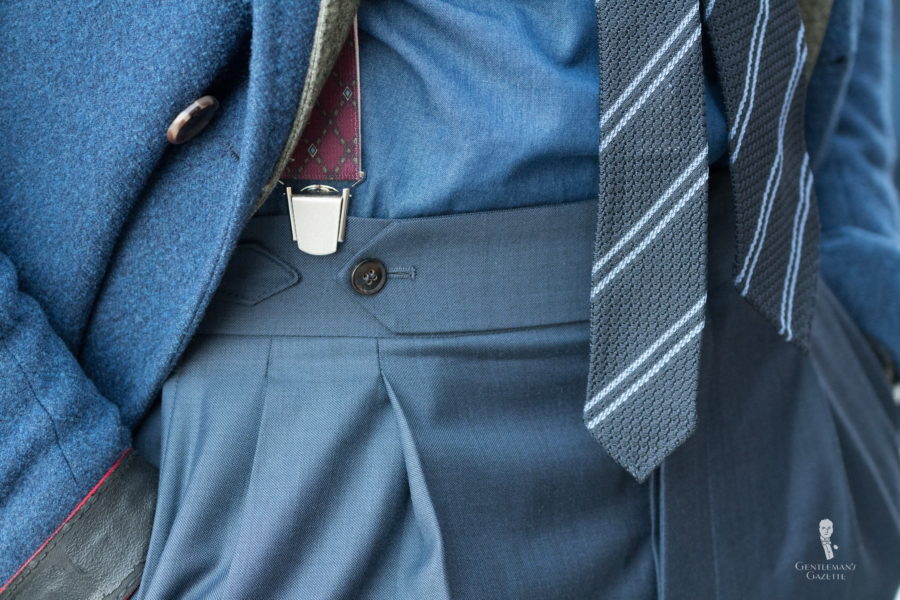
Clip-on suspenders with grenadine tie – study of greys and blues
Lastly, if you prefer to wear a large tie knot, like a half-Windsor, or want to minimize your tie knot, the smaller grenadine weaves are a better choice. Garza grossa ties are called “large-knot grenadines” for a reason: the nature of the weave results in a fairly thick tie that will make a substantial four-in-hand knot. If you wear a four-in-hand anyway, garza grossa will give you one that is definitely not anemic.
Lined or Unlined Grenadine Ties? It’s A Matter Of Choice
Neckties can come either lined or unlined. With a grenadine, you’re likely to find both options. The lining or interlining is a piece of fabric, usually wool, used on the inside of the tie to give it more body. Because the open weave on a grenadine allows you to see through the tie to some extent, if you have a lining, it will be dyed the same color as the silk shell. Lined ties tend to look more finished, so they are most appropriate for business suits.
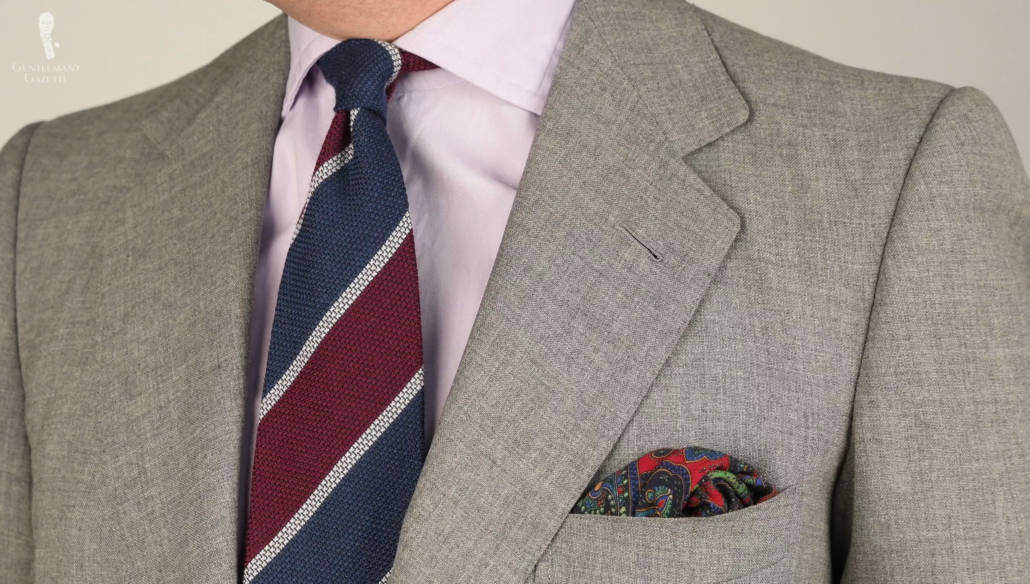
A Cashmere-Wool Grenadine Tie in Dark Blue, Burgundy, Light Grey Stripe from Fort Belvedere, paired with a light gray suit, lavender shirt, and patterned pocket square
Unlined ties, especially in an airy grenadine weave have more of a handmade artisanal look, which can also make them appear more casual. Because of the thinness of an unlined grenadine, you will also see the impression of the tie folds on the underside and perhaps the shape of the keeper as well. Some men dislike this because people who don’t know about ties will assume theirs is defective in some way.
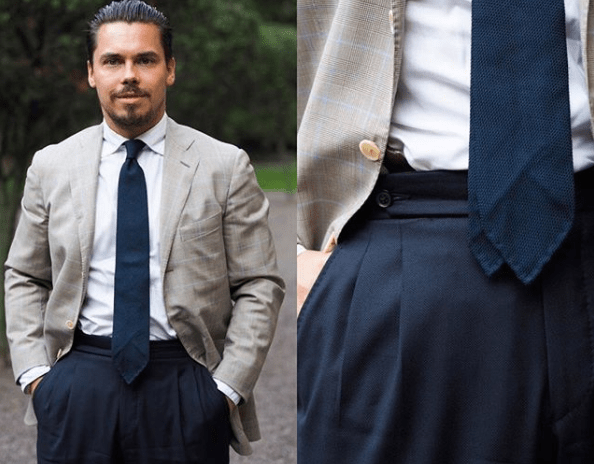
Atte Rytkönen wearing an unlined grenadine tie; you can see the impression of the underside through the fabric.
As a counterpoint, the less finished appearance of an unlined grenadine provides a dash of sprezzatura: the characteristic Italian nonchalance in dressing that avoids perfectionism, so if you want to show this sort of rakishness, unlined is the way to go. A garza fina or piccola without lining is especially light and wispy, which also makes it an ideal tie for hot weather days.
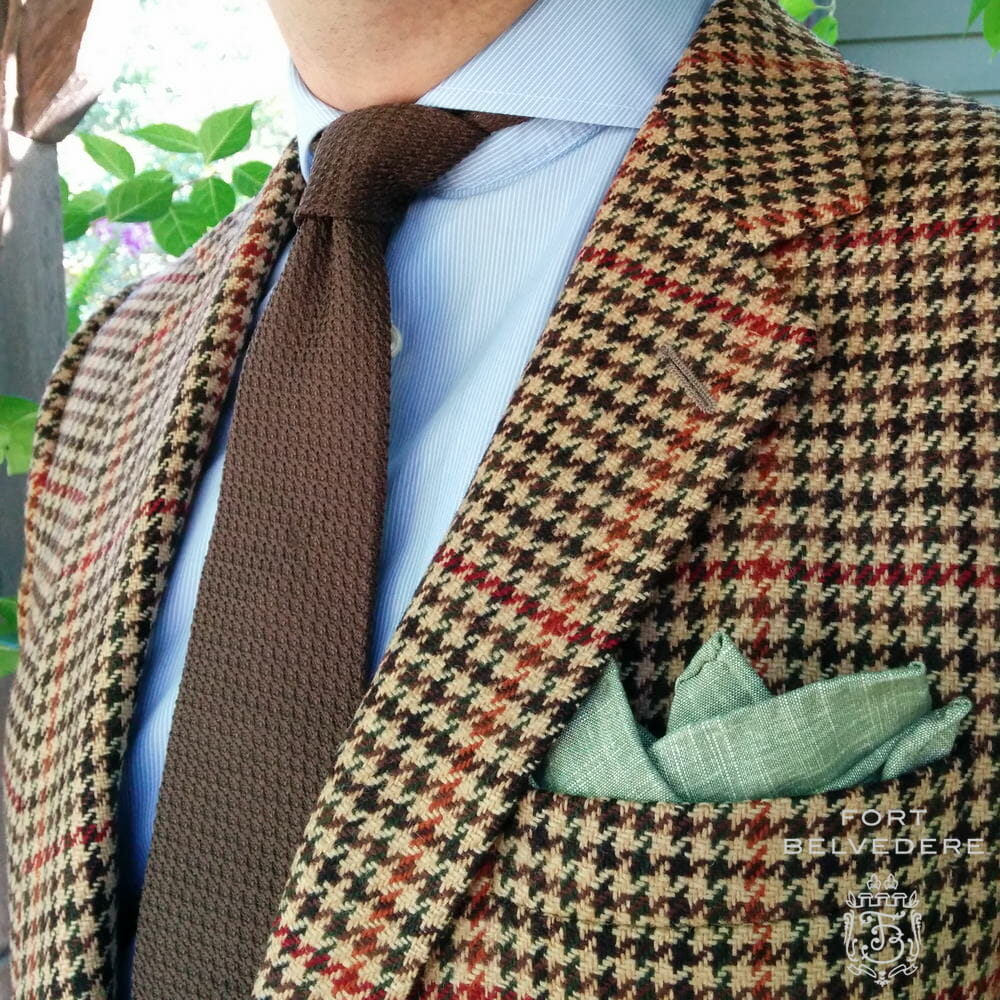
A Brown Grenadine Tie from Fort Belvedere paired with a houndstooth jacket, blue shirt, & green linen pocket square
Its thinness pairs beautifully with a giro inglese shirt and a linen sport coat for a quintessential summer style. In this way, an unlined grenadine really returns to its roots as a breathable summer weave. Lastly, if you prefer a small tie knot, unlined is your best option. As already discussed, grenadines form a fairly thick knot, and a lining will only add more thickness. You can pull your tie tighter to shrink the knot, but then your risk stretching the fabric and making your tie too long. Keep in mind though that even an unlined garza grossa makes for a fairly thick knot, so you’ll want an unlined garza fina if you tie a or to stick to a four-in-hand knot with these.
A Word on Faux Grenadine Ties – Skip Them
In recent years, fake grenadine ties have appeared online, capitalizing on the popularity of the real thing. These can be had quite cheaply, for under $20, and they have a similar look from afar, so they’re popular for those on a budget. If you just want some texture and don’t care if your tie is an authentic grenadine, you might settle for these. However, the Gentleman’s Gazette upholds the general principle that it is preferable to buy better quality items that will last rather than “cheaping it out” in the short term.
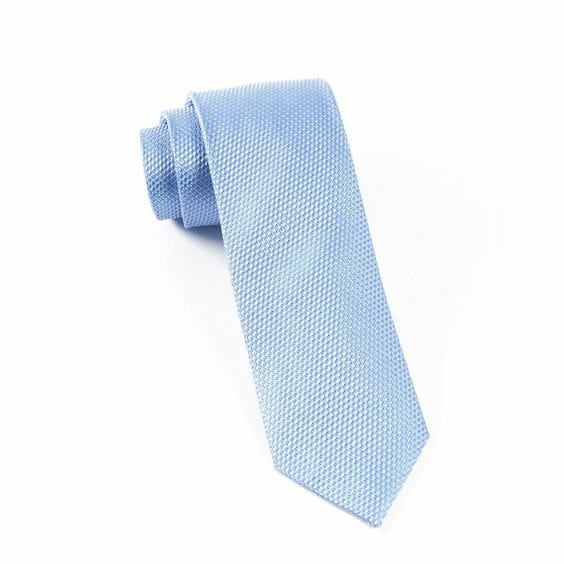
A false grenadine, which has texture but no open weave.
You will likely desire an authentic grenadine tie eventually, and will probably have to replace the cheap one as it wears out faster–not to mention that it will never look as splendid as the real deal. The cost ($125 at Fort Belvedere) is not exorbitant–you’re not buying a Cifonelli suit after all–and you can choose a versatile color like navy, burgundy, red, or black that will get good use with the classic menswear colors of blue and gray. As a bonus, Fort Belvedere allows you to choose both the width and length.

The Fort Belvedere Shop offers grenadine ties in multiple colors and lengths.
Conclusion – Grenadine Ties Are An Essential Wardrobe Staple
There’s a good reason why a grenadine tie is considered a staple menswear item and an essential tie for every man. Solid grenadines come in a seemingly infinite range of colors, not to mention differently sized weaves, making them not only versatile but ultra-collectible. Meanwhile, a striped grenadine, especially one made of mixed materials, is just plain beautiful. So, if you’ve never tried a grenadine, now is the time to get one, and if you already swear by them, why not select another color for your collection?
How many grenadine ties are in your collection? Do you have a preferred weave? Share with us in the comments!
Source: gentlemansgazette.com

Комментариев нет:
Отправить комментарий